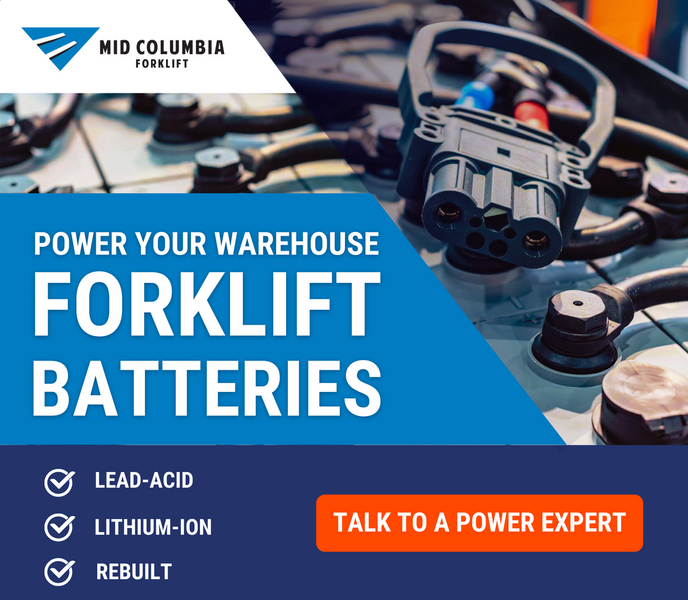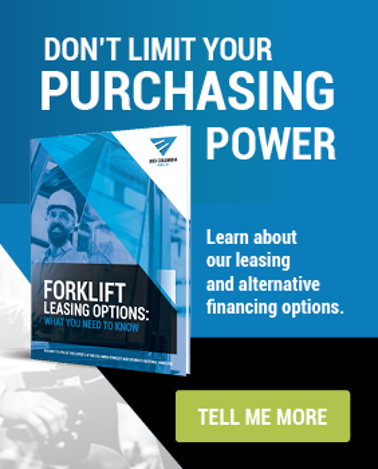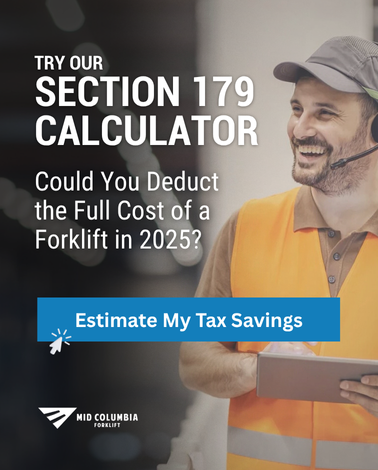What to Expect When You Convert to a Lithium-Ion Fleet
by Ricky Dunn, on September 20, 2024 at 6:18 AM
 If you’re currently using forklifts and other material handling equipment powered by lead acid batteries, switching to lithium-ion batteries can help you:
If you’re currently using forklifts and other material handling equipment powered by lead acid batteries, switching to lithium-ion batteries can help you:
- Save money
- Enhance safety
- Reclaim space in your facility
- Free up operator time
Though they cost more than lead-acid batteries up front, lithium-ion batteries last longer and pay for themselves in 2-5 years. Here’s what to expect when you switch from lead acid to lithium-ion batteries and how to make the transition as smooth as possible.
Lead Acid vs. Lithium-Ion Batteries
Lead acid batteries are like a toddler. You have to change them every day and sometimes you have to clean crud off of them.
Lithium-ion batteries:
- Don’t require maintenance
- Have longer run-times
- Can be discharged to 20% (compared to 30-50% for lead acid)
- Are designed for opportunity charging
- Don’t need to be swapped between shifts
- Don’t need to be watered
Why Use Lithium-Ion Forklifts?
Buy Fewer Batteries
If you run a multi-shift operation, you may have two or even three batteries per truck. With lithium-ion, the battery stays in the forklift all the time. A lithium-ion battery can last up to two shifts on a single charge and you can opportunity charge them without damaging the battery.
Lithium-ion batteries also have a longer lifespan than lead acid. If you’re currently getting three years out of your lead acid battery, a lithium battery will last six years at least, up to eight or even 12 years.
Save Money
In addition to buying fewer batteries, your energy usage will decrease. Lithium-ion batteries use 30-50% less energy than lead acid because of their longer runtime.
The average warehouse spends 15% of its operating budget on energy costs. Reducing that amount by even a percentage point or two will benefit your bottom line.
Lastly, you can reassign team members who currently swap and maintain batteries to more fruitful tasks.
Reclaim Space
Because lithium-ion batteries don’t need to be watered or swapped, you can reclaim the space you currently use for battery charging, changing and maintenance.
ROI in 2-5 Years
Lithium-ion batteries typically pay for themselves in 2-5 years. If you run a multi-shift operation, that timeframe will be 2-3 years. For single-shift operations it can take up to five years.
If your current fleet is mostly diesel, gas or LP forklifts, you can recoup your lithium-ion investment even faster. Learn more about how to get paid for switching to electric equipment.
Converting From Lead Acid to Lithium-Ion — What to Expect
Your existing electric forklifts can be converted to lithium-ion forklifts in three steps. The technician will:
- Remove the lead-acid battery
- Put in a lithium-ion battery of the same voltage
- Add extra ballast and a charge meter
Facility Changes
As mentioned above, you don’t need a dedicated space for battery charging or swapping when you use lithium-ion batteries. Instead, you can put chargers wherever it's convenient — on a wall, a post or set up a charging rack. Supervisors and operators might have good ideas about charger placement.

When deciding how many chargers you need, consider:
- The number of forklifts operating at any given time
- Typical usage patterns
- Lithium-ion batteries are designed to be charged in 10-20 minute bursts
Procedural Changes
Operators accustomed to forklifts with lead-acid batteries need to know a few things:
First, they’ll get consistent power throughout the shift. There’s no drop in performance as battery power declines. Operating a lithium-powered forklift will feel more like operating a propane forklift.
Second, operators will need guidance on your new charging procedures. Charging a lithium-ion forklift or pallet jack is easy, you just plug it in. Remembering to charge the equipment during breaks and between shifts is the biggest adjustment. Posting reminders on brightly colored paper near the time clock is a simple solution.
Lithium-Ion Batteries for Forklifts and Pallet Jacks
MidCo Power offers powerful, affordable lithium-ion batteries for:
- Forklifts
- Pallet jacks
- Automated guided vehicles (AGVs)
- Aerial equipment
- Floor scrubbers/sweepers
- Golf carts
- Utility vehicles
We can also make custom battery packs for whatever you need. Customers love our Universal Lithium Battery Supply (ULBS) battery packs. They’re made by CATL, the battery supplier for Ford and Tesla, among others. The batteries are durable, reliable and built to last — with zero cell failures to date.
Mid Columbia Forklift and MidCo Power can help you make the transition to lithium-ion as easy and affordable as possible, including taking advantage of government incentives.
Please contact us online or by phone with any questions you may have. We’re also happy to refer you to clients who've used our services.
Auburn 253-854-5438
Pasco 509-547-7413
Wenatchee 509-663-9009
Yakima 509-457-5137
Further Reading
Guide to Forklift Battery Types
What Is Opportunity Charging and Is It Right For Your Electric Forklift?
When to Repair Vs. Replace Your Forklift Battery





